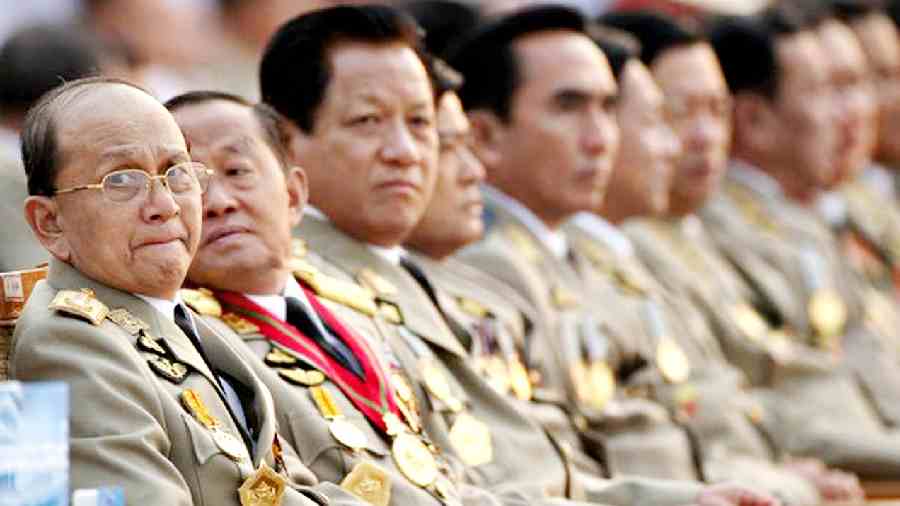Through a coup in February 2021, the Burmese military (Tatmadaw) dismissed the elected civilian government, prompting massive protests in the country. The Tatmadaw sought to contain the opposition through coercive tactics and by sentencing democracy activists to prolonged incarceration and capital punishment. On December 30, Aung San Suu Kyi, winner of the Nobel Peace prize and Myanmar’s leading politician, was sentenced to a further seven years in prison by a military court, making it a total of 33 years under various charges, which most observers consider to be trumped-up fabrications. By this verdict, the Tatmadaw delivers another signal that it will not negotiate with the democratic opposition.
The recent verdict also flies against the United Nations Security Council resolution of December 21 which called for an “immediate end to all forms of violence, the de-escalation of tensions and the release of all prisoners”, which was approved despite the permanent members, the United States of America and Russia, being currently at loggerheads on international platforms, revealing the growing consternation in the global community about Myanmar. The resolution also noted that the UNSC “responded to the calls of ASEAN leaders for support and sent a firm message to the military”.
In April 2021, ASEAN had proposed a five-step roadmap for the member-state, Myanmar, which included mediation by an ASEAN special envoy. Since then, this envoy has sought in vain to meet political prisoners such as Suu Kyi and the five-point plan has been stalled. ASEAN riposted by not inviting Tatmadaw leaders to its summits nor to the ASEAN Defence Chiefs meeting last November. There are growing demands among many frustrated ASEAN members that the organisation should now desist from its policy of ‘constructive engagement’ and invite Myanmar’s opposition, the National Unity Government, to its meetings. But no consensus has emerged on how to deal with its renegade member and in December, Thailand broke ranks by inviting foreign ministers of members sympathetic to Naypyidaw — namely Thailand, Cambodia, Vietnam and Laos — to an informal meeting along with Myanmar.
The US Senate has authorised an amended version of Burma Unified (an Act to authorise humanitarian and civil society support, promote democracy and human rights, and impose targeted sanctions) —namely the Burma Act 2021, which authorises the White House to impose sanctions on the Tatmadaw and extend aid to Opposition groups. Even though the Burma Act does not specify the provision of weapons to resistance groups, the National Unity Government of Myanmar interpreted the legislation as support for its People’s Defence Force and other anti-Tatmadaw bodies.
In response to the growing criticism, the Tatmadaw released some prisoners in November, including the Australian, Sean Turnell, who spent 650 days in custody, and the former British ambassador, Vicky Bowman. However, these releases were tactical rather than a course correction, and despite its regular condemnations, the international community has been unable to press the Tatmadaw towards any negotiated internal reconciliation process. Instead, the Tatmadaw is considering a three-pronged strategy to consolidate its rule. First, continuing the military campaign against opponents by which over 2000 people were killed in the past year. The UN High Commissioner for Human Rights has noted that over 139 people had been sentenced to death in trials whose legitimacy was highly questionable. Despite its use of excessive force, the Tatmadaw has been unable to subdue the entire country and its forces have evidently suffered heavy causalities while combating armed ethnic groups such as the Kachin and the Karen. Large areas remain under the control of anti-government groups. Following a spell of intense fighting, a ceasefire between the Tatmadaw and the ethnic Arakan Army has been negotiated by Yohei Sasakawa, the chairperson of the Nippon Foundation.
Second, the Tatmadaw is contemplating holding a multi-party general election in 2023 subject to ‘peace and stability’, hoping that some in Suu Kyi’s National League for Democracy can be persuaded to contest along with a few ethnic parties. But there is resistance to this plan from various quarters; for instance, the Karen National Union has rejected the proposal, terming it as an attempt by the Tatmadaw to legitimise itself.
Third, the Tatmadaw appears inclined to alter the electoral system from first-past-the-post to proportional representation. Under the proportional representation system, the legislature is constituted by the percentage of votes each party receives and the Tatmadaw calculates that small ethnic parties and others favouring the military might find greater representation, with no party securing an absolute majority. Since 25% of the membership is anyway reserved for the military, the Tatmadaw would then be dominant in government and policy formation.
The Tatmadaw knows it will require considerable diplomatic support from its main supporters, Russia and China, to rebuff international criticism and validate its proposed roadmap for an election under its changed provisions. It will hope that the rest of the world will slowly adjust to the new situation and, albeit grudgingly, engage with the new ‘elected government’. Nevertheless, with deep public discontent, the unwillingness of major ethnic groups to participate in the proposed elections, growing international condemnation, and the disillusionment of ASEAN, it is doubtful whether the Tatmadaw will secure the legitimacy it seeks, and its strategy may unleash even greater violence in the coming months.
Krishnan Srinivasan is a former foreign secretary. Sanjay Pulipaka is the chairperson of the Politeia Research Foundation.










